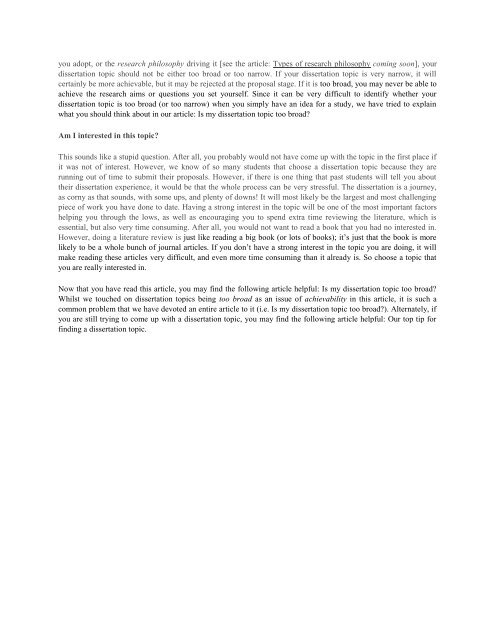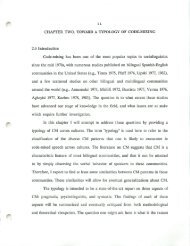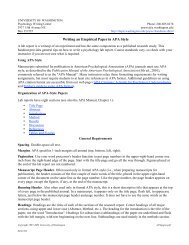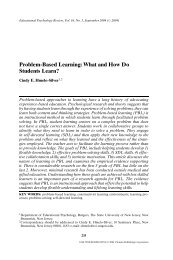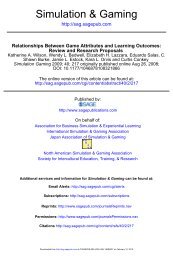Informal Readings on Selecting a Research Topic
Informal Readings on Selecting a Research Topic
Informal Readings on Selecting a Research Topic
Create successful ePaper yourself
Turn your PDF publications into a flip-book with our unique Google optimized e-Paper software.
you adopt, or the research philosophy driving it [see the article: Types of research philosophy coming so<strong>on</strong>], your<br />
dissertati<strong>on</strong> topic should not be either too broad or too narrow. If your dissertati<strong>on</strong> topic is very narrow, it will<br />
certainly be more achievable, but it may be rejected at the proposal stage. If it is too broad, you may never be able to<br />
achieve the research aims or questi<strong>on</strong>s you set yourself. Since it can be very difficult to identify whether your<br />
dissertati<strong>on</strong> topic is too broad (or too narrow) when you simply have an idea for a study, we have tried to explain<br />
what you should think about in our article: Is my dissertati<strong>on</strong> topic too broad?<br />
Am I interested in this topic?<br />
This sounds like a stupid questi<strong>on</strong>. After all, you probably would not have come up with the topic in the first place if<br />
it was not of interest. However, we know of so many students that choose a dissertati<strong>on</strong> topic because they are<br />
running out of time to submit their proposals. However, if there is <strong>on</strong>e thing that past students will tell you about<br />
their dissertati<strong>on</strong> experience, it would be that the whole process can be very stressful. The dissertati<strong>on</strong> is a journey,<br />
as corny as that sounds, with some ups, and plenty of downs! It will most likely be the largest and most challenging<br />
piece of work you have d<strong>on</strong>e to date. Having a str<strong>on</strong>g interest in the topic will be <strong>on</strong>e of the most important factors<br />
helping you through the lows, as well as encouraging you to spend extra time reviewing the literature, which is<br />
essential, but also very time c<strong>on</strong>suming. After all, you would not want to read a book that you had no interested in.<br />
However, doing a literature review is just like reading a big book (or lots of books); it’s just that the book is more<br />
likely to be a whole bunch of journal articles. If you d<strong>on</strong>’t have a str<strong>on</strong>g interest in the topic you are doing, it will<br />
make reading these articles very difficult, and even more time c<strong>on</strong>suming than it already is. So choose a topic that<br />
you are really interested in.<br />
Now that you have read this article, you may find the following article helpful: Is my dissertati<strong>on</strong> topic too broad?<br />
Whilst we touched <strong>on</strong> dissertati<strong>on</strong> topics being too broad as an issue of achievability in this article, it is such a<br />
comm<strong>on</strong> problem that we have devoted an entire article to it (i.e. Is my dissertati<strong>on</strong> topic too broad?). Alternately, if<br />
you are still trying to come up with a dissertati<strong>on</strong> topic, you may find the following article helpful: Our top tip for<br />
finding a dissertati<strong>on</strong> topic.


